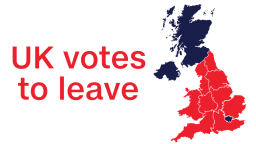Go here to follow CNN’s coverage of the UK referendum live.
Story highlights
Markets plunged at the news
Scotland may hold an independence referendum
Some parties in other countries call for an EU vote
The United Kingdom’s historic Brexit vote to leave the European Union triggered the resignation Friday of British Prime Minister David Cameron and wreaked havoc on global markets.
There was a mixture of jubilation and tearful disbelief in the UK as people awoke to the final result from Thursday’s extremely close vote, which deeply divided the nation.
The result plunged Europe into uncertainty, with calls for further referendums from emboldened far-right groups who see it as a boost for their anti-EU, anti-immigration policies.
It also reverberated across financial markets, causing huge losses in Asia, Europe and the United States as traders weighed the consequences for the world’s biggest economic zone.

Within hours of Thursday’s ballot outcome – 51.89% in favor of leaving the EU and 48.11% against – Cameron delivered an emotionally charged statement outside the Prime Minister’s residence at 10 Downing Street, announcing his intention to stand down.
Cameron’s possible successor
“The British people have voted to leave the EU and their will must be respected,” he said. “The will of the British people is an instruction which must be delivered. … There can be no doubt about the result.”
Cameron gave no timetable for his departure but said he wanted a new leader to be in place by October, when his Conservative Party holds its annual conference.
He said the country needed a pro-exit leader to steer it out of the EU, an organization it has been a part of since 1973. That process could take at least two years.
Boris Johnson, the former mayor of London who campaigned for the UK’s departure from the EU, is tipped by bookmakers as Cameron’s likely successor.
Johnson, who was greeted by a booing crowd when he left his home on Friday morning, thanked voters for their decision, pledged that the UK would remain committed to Europe and urged unity.
“I think the electorate have searched in their hearts and answered as honestly as they can,” he said. “They have decided to vote to take back control from a European Union that has become too remote.”
Former PM: There will be costs
Former British Prime Minister Tony Blair told CNN’s Wolf Blitzer that UK voters would learn over the next 24 months that leaving Europe will not solve their economic troubles, ease their apprehensions or make Britain more independent in a meaningful way.
“I literally cannot think of a big decision that I was not able to take because of Europe,” Blair said. “There is so much anger at the moment that the anger replaces the more rational answers.”
Blair noted that the United States was facing the same type of political fracturing, brought on by economic turmoil, globalization and anger at immigration.
“Getting out of Europe is not the answer,” he said, noting the UK sells half of its goods and services to the EU. “We are going to have to negotiate ourselves back into that market and it will be much more difficult than these people understand.”
Possible Scottish independence vote
In Scotland, where support was overwhelmingly in favor of remaining in the EU, Nicola Sturgeon, Scotland’s First Minister and leader of the dominant Scottish National Party, said the outcome threw into doubt the future of her country’s place in the UK.
She said the Scottish government will begin preparing legislation for a new independence referendum if the Scottish Parliament decides it wants to hold one. Scots voted down a bid for independence from the UK in 2014.
“Democratically unacceptable,” said Sturgeon in describing the fact that Scotland would be pulled out of the European Union despite the majority of the Scottish people voting to stay in.
MORE: What does Brexit mean for you?
Sinn Fein calls for Irish unity
The Sinn Féin party in Northern Ireland called for a referendum on Irish unity, which could take Northern Ireland out of the UK and join it with the Republic of Ireland, an EU member.
Voters in Northern Ireland voted for the UK to remain in the EU.
Sinn Féin President Gerry Adams said the Brexit result could portend tougher border rules – with barriers and custom posts – between Northern Ireland and the Republic of Ireland, because it will be the only land border between the EU and the UK.
Adams said such a result would be unacceptable given the vote result in Northern Ireland and could undermine the cooperative relationships and that have developed between the two Irelands since the Good Friday agreement.
“My issue is the north of Ireland is going to be dragged out of the EU on the decision made by people on another island,” said Adams, whose political party is dedicated to the reunification of Ireland.
“We’re calling for a poll, a referendum, on Irish unity, on the border. This (the Brexit vote) has the potential to set back the good work that’s been done in terms of the peace process, building harmony, building infrastructure.”
‘Dying’ institution
As European leaders faced their own crises, German Chancellor Angela Merkel stressed the “need to make sure that European people feel that the EU wants to improve all our lives.”
She said she greatly regretted the UK’s decision, but added, “The EU is strong enough to find the right answers today.”
French President Francois Hollande called it a “painful choice which I deeply regret for the UK and Europe.”
Italy’s finance minister, Pier Carlo Padoan, warned of a domino effect amid calls for further exit votes.
Far-right Dutch politician Geert Wilders congratulated the UK on its decision and called for a Dutch referendum on EU membership.
“We want to be in charge of our own country, our own money, our own borders and our own immigration policy,” he was quoted as saying in a statement on his website.
Marine Le Pen, the leader of France’s National Front party who plans to run for the French presidency next year, also congratulated the Brexit side.
Her party has suggested the French will also hold an “out” referendum if she assumes the presidency.
Passions continued to run high in the UK in the hours after the vote, with UK Independence Party (UKIP) leader and Leave campaigner Nigel Farage declaring the EU a “dying” institution.
“We’ve given ourselves the chance to rejoin the world,” he told journalists. “June 23rd needs to become a national bank holiday and we will call it Independence Day.”
U.S. President Barack Obama said that while the UK’s relationship with Europe was changing, the ties that bound the UK to the United States and the United States to Europe would remain.
“I do think yesterday’s vote speaks to ongoing changes and challenges that are raised by globalization, but the UK’s relationship with the EU will change. What will not change is the special relationship that exists between our two nations,” Obama said. “That will endure. And the EU will remain one of our indispensable partners.”
MORE: Full coverage of the UK referendum
NATO: UK will stay a strong ally
NATO Secretary-General Jens Stoltenberg voiced reassurances that the United Kingdom will remain a strong and committed NATO ally despite the vote.
“Today, as we face more instability and uncertainty, NATO is more important than ever as a platform for cooperation among European allies and between Europe and North America,” said Stoltenberg. “A strong, united and determined NATO remains an essential pillar of stability in a turbulent world and a key contributor to international peace and security.”
Voters react
The referendum followed one of the most divisive political campaigns in recent memory. Polls consistently showed voters split down the middle, with the outcome too close to call ahead of the vote.
News of the decision sparked strong emotions, with those in favor and those against reflecting on a campaign marred by allegations of lies, distrust and hate.
“This is so sad,” said Daniel Trilling on Twitter. “Millions of people aren’t going to feel any more in control of their lives or their country because of this vote.”
“People vote on emotion,” Twitter user @cemanthe posted. “This was won on false promises and emotive texts about immigration. Not on facts.”
“I am SO happy this morning,” wrote another, Gemma.
An online petition calling for a second referendum gathered more than 120,000 signatures within hours of being posted.
Leading political figures gave mixed reactions.
Tony Blair, the former UK prime minister, called the decision a divided result.
“It’s going to be a complicated process but it’s important to bring our country together and stabilize our country,” he told CNN’s Becky Anderson. “It’s still a resilient country and it’s a strong country.”
Sadiq Khan, the mayor of largely pro-EU London, said the decision was a “clear message” and urged calm.
‘Taking back control’
European Council President Donald Tusk said the decision was “historic, but not a moment for hysterical reactions.”
Donald Trump, the presumptive Republican nominee in the U.S. presidential election, hailed the UK’s decision to “reassert control over their own politics, borders and economy.”
In a news conference Friday as he attended the official opening of a remodeled golf resort bearing his name in Turnberry, Scotland, Trump called the decision of the voters “a great thing.”
“They’re angry over borders, they’re angry over people coming into the country and taking over. Nobody even knows who they are,” he said. “They’re angry about many, many things. They took back control of their country.”
UKIP’s Farage told CNN’s Nima Elbagir that the economic fears in the wake of the EU departure were overstated, and that he expected an even better relationship with the United States. He said the vote was a repudiation of bullying tactics by corporate and political powers to keep the UK in the EU.
“(We were) threatened by everybody that if we didn’t stay part of this political union, dreadful things would happen to us, and what happened were the little people, the regular people, the ordinary people said, ‘No, this is wrong,’” Farage said.
“When you really think about it, what we’ve done isn’t actually that radical. … We want to be a democratic nation. We want to make our own laws in our own parliament, have our own supreme court, and control our own border. If you think about, there’s now 183 countries around the world that have independence days. What we did yesterday was become 184th.”
Opinion: Why Brexit vote should worry Trump
Markets plunge
The effects of the vote outcome were immediately felt in markets and economies around the world.
In New York, the Dow ended the day down more than 611 points, to close at 17,399. London’s FTSE index shed $164 billion of its value in the first 10 minutes of trading, but regained ground later in the day.
The NASDAQ index fell more than 4% and into a correction, or down 10% from recent highs.
The British pound at one point plunged more than 12% to below $1.34, its lowest level since 1985. Japan’s Nikkei tanked 6.7% and Hong Kong’s main index dropped 3.7%.
Bank of England Governor Mark Carney said the body is “well prepared” and “won’t hesitate” to take additional measures as markets adjust.
The “UK financial system is resilient,” he added.
CNN’s Bryony Jones, Phil Black, Nic Robertson, Richard Allen Greene, Simon Cullen, Sebastian Shukla, Tim Lister, Vasco Cotovio, Kevin Liptak, Anais Furtade, Umaro Djau, Jomana Karadsheh and Deborah Bloom contributed to this report.





